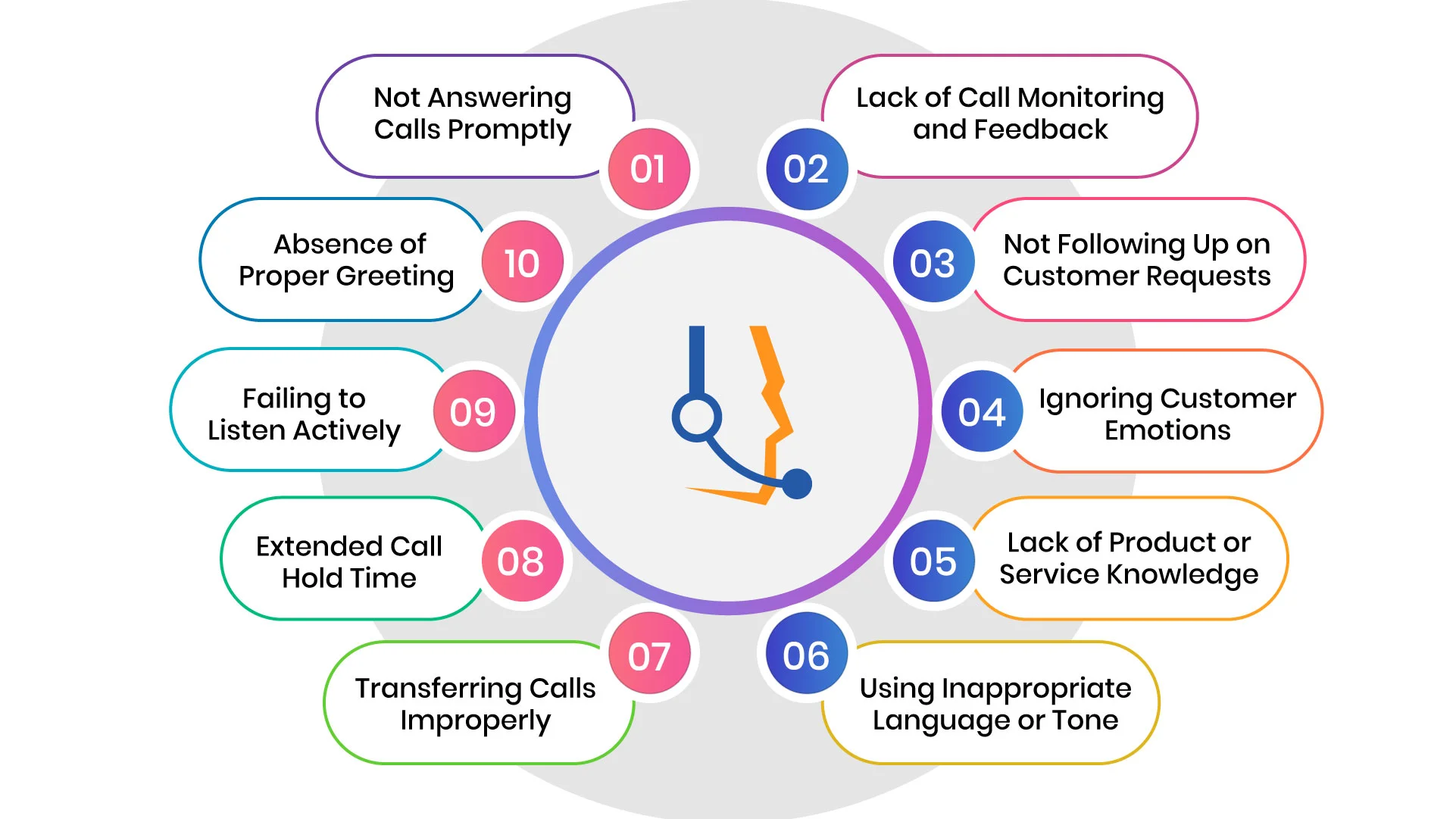
10 Call Handling Mistakes to Avoid for Success
Call handling is a huge responsibility, especially when it comes to providing the leads with the proper solution they seek. The customer interaction over the phone depicts the company’s image. It is the first interaction between possible clients and your brand. This is the reason why poor call management can result in lost clients, negative reviews, and decreased revenue.
With the regularly upgrading landscape of the digital arena, marketing and sales are also relying more on responding to customers from different channels to keep the interaction alive. This is why phone interactions are not the only significant factor in making and breaking the deal. The bad call experience will automatically lead to a damaged reputation, loss of trust, and even a decline in customer retention.
Research shows that in the US, businesses suffer a loss of $41 billion due to negligence towards customer support
In a fast-growing world that is expanding the horizons of customer support, some businesses, regardless of their size, neglect appropriate call handling. It's assumed that answering the phone is simple, and anyone can do it.
Significance Of Professional Call Handling
Effective contact develops the impression of professionalism. Expert communication instantly grabs customers' attention over the phone and requires skill, tolerance, and an understanding of customer expectations. From sales inquiries to customer complaints or requests for information, every call must be handled with professionalism and care. Failing to do so can lead to frustration, missed opportunities, and lost revenue.
Are you looking to improve your business and become more popular among your consumer base? It's important to be aware of common call-handling mistakes and take proactive steps to prevent them. To develop a connection with your clients, you need to train employees, use the right technology, and implement best practices to improve call efficiency.
In this article, we discuss the 10 most common call handling mistakes and their solutions for businesses.
 1. Not Answering Calls Promptly
1. Not Answering Calls Promptly
Prompt responses are essential for making your conversation helpful, especially regarding lead acquisition purposes. Delays in responding to your leads can result in customer frustration and, ultimately, loss of the client. If you ignore or neglect your call, your customers feel they are not crucial to your business. Missed calls can mean lost sales and a sabotaged reputation, especially in industries where prompt responses are required.
Solution: Policy Formation
There should be a firm and strict policy regarding call answering, and it should be mandatory to pick up the call within the first three rings. Call forwarding, automated attendants, and voicemail systems should be optimized to ensure no call goes unanswered. Investing in a dedicated call-handling team or outsourcing to a professional call centre can help maintain prompt response times.
2. Absence of Proper Greeting
Is your client not feeling welcomed with the professional greeting script? Don't give them the wrong tone of your conversation through an unprofessional and impersonal greeting. If you cannot show warmth and compassion to your leads and call them, then they will not feel the worth of their interest in your business, questioning its credibility.
Solution: Customized Script
Companies that hire call centres are fortunate in that they train their employees to work with customers and provide solutions. But for the in-house customer support, train employees to greet callers enthusiastically and professionally. A structured greeting should include the company name, the agent's name, and a willingness to assist.
For example, "Thank you for calling [Company Name], this is [Your Name]. How may I assist you today?" This sets a positive tone and reassures the caller that they are speaking with a competent representative.
3. Failing to Listen Actively
If you are not a good listener, you will never be able to provide your clients with solutions cause you will not be able to understand their issues. This can result in the client's frustration when you interrupt while they are explaining their queries. The reason why they call you rather than email is that customers expect to be heard and valued. The interaction can feel rushed or unhelpful when agents fail to listen actively.
Solution: Training Agents
If you have an in-house team, then try to make sure every agent is trained efficiently through different techniques such as paraphrasing customer concerns, asking clarifying questions, and taking notes. Avoiding interruptions and using affirmations like "I understand" or "Let me confirm that for you" can make customers feel acknowledged and valued.
4. Extended Call Hold Time
Long hold times discourage customers and may cause them to hang up before their issue is resolved. Excessive hold times suggest inefficiency and poor service quality.
Solution: Minimize Hold Time
Minimize hold times by ensuring agents have quick access to necessary information. Provide training on multitasking and using knowledge bases efficiently. Offer callback options for customers who cannot wait on hold, improving the overall experience and reducing frustration.
5. Transferring Calls Improperly
Poor call transfers can result in lost information, forcing customers to repeat themselves, which can be frustrating and time-consuming.
Solution: Confirmation From Recipient
Before transferring a call, agents should explain why the transfer is necessary and confirm the recipient is available to take the call. Providing relevant details to the next agent ensures a smooth transition. A warm transfer, where the agent introduces the caller before disconnecting, improves the experience significantly.
6. Using Inappropriate Language or Tone
Your team needs to know that while you are talking to the caller, your tone needs to be professional and empathetic. Keeping a rude, dismissive, or robotic tone will surely alienate customers and damage the business’s reputation. It doesn't matter if you have your point and logic; a lack of warmth or empathy can create a negative impression.
Solution: Professional Call Answering
If you are training your call-handling professionals, ensure regular and professional communication with empathy and tone modulation is a part of it. Role-playing exercises help employees develop an approachable and professional tone. Encourage agents to smile while speaking, as this naturally enhances warmth in their voice.
7. Lack of Product or Service Knowledge
How can you provide the knowledge to the callers when you yourself are not aware of the product and the service provided by your company? This is one of the top reasons that your client will prefer your competitor. If you provide wrong information about the company's products or services, this will eventually result in customer dissatisfaction and loss of trust.
Solution: Product Knowledge
Make sure that the basic step of training, which involves orientation and then presentation of knowledge about your product, is done accurately. This may seem similar to a very initial step, but if this is not done properly, you will only lose your clients. Creating a centralized knowledge base that agents can quickly reference during calls improves response accuracy and efficiency.
8. Ignoring Customer Emotions
Failing to acknowledge a customer’s frustration or emotions can escalate the situation. Customers want to feel heard and understood, especially when they are upset.
Solution: Resolution Through Compassion
Train agents to use empathetic language such as "I understand how frustrating this must be for you." Encouraging a compassionate approach, where agents actively seek to reassure and resolve issues, can significantly enhance customer satisfaction.
9. Not Following Up on Customer Requests
When you dont follow up on a customer’s issue or request, it can lead to dissatisfaction and a loss of trust in the business.
Solution: Observing Client Follow-ups
Implement a tracking system to log customer requests and assign follow-ups. Agents should provide estimated resolution times and proactively update customers on progress, reinforcing reliability and accountability.
10. Lack of Call Monitoring and Feedback
Recurring mistakes may go uncorrected without performance tracking, leading to long-term service quality issues.
Solution: Feedback Forms
Regularly monitor calls to assess agent performance and identify areas for improvement. Providing constructive feedback and ongoing training ensures agents continually refine their skills and enhance customer interactions.
Conclusion: Why Hiring a Professional Call Center is Essential
Avoiding these mistakes requires dedication, training, and resources. Businesses that want to ensure high-quality customer interactions should consider hiring a professional call centre. As they specialize in customer service, employ well-trained agents, and use advanced call-handling technology to communicate seamlessly, your issue of hiring, purchasing, and upgrading the setup will also be solved. By outsourcing to a reliable call centre, businesses can enhance customer satisfaction, improve efficiency, and focus on core operations.
Investing in professional call handling ensures that customers receive the best service possible, leading to increased loyalty and business growth. Don’t let poor call management harm your reputation—partner with experts who can handle customer interactions flawlessly.
Leave A Reply
Your email address will not be published. Required fields are marked *


